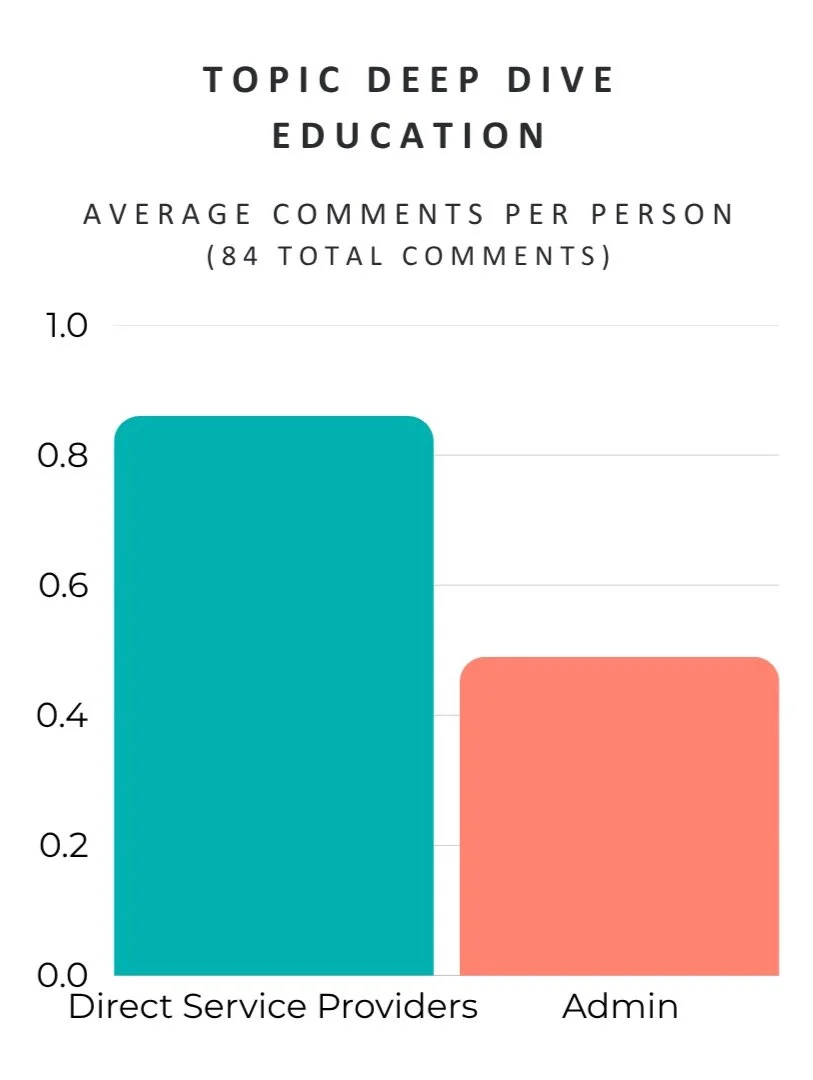
Education
Both providers and administrators shared degree requirements were a barrier for people entering the field, as well as a reason for leaving. Sub-themes for this category included a desire for a system that gives credit for lived experience, a desire for an apprenticeship type training system, and a dissatisfaction with the current IECMH Endorsement.
Sub-topics
There were three subtopics identified below. Click on the arrow next to each topic to learn more and read quotes.
-
Participants shared a desire for individuals to be able to use their lived experience as a form of credential, or pathway, to advance in a career. Many people, particularly those in immigrant or diverse communities, have experience doing community based social work in how they navigate the complexity of their personal lives. This type of experience is often overlooked or undervalued in the hiring process.
“I think part of what I see as an opportunity for change is valuing people's work without degrees. How do we make space or create some sort of support for people that maybe college isn't for them? How can we support people to do really valuable, meaningful work in our community with families that isn't necessarily like a master's level degree. because they're already doing it.” - From a direct service provider
“I would also ease that pipeline through apprenticeship programs and give more job access through lived experience rather than degrees and expensive education.” - From an administrator
-
There was an interest in learning from other fields, particularly the trades, where people could learn the position through on-the-job experience rather than through formal education.
“I love the apprenticeship model of the trades where you can be learning and making money as you go. I think it needs to be that way so that these workers are valued and not treated, quite frankly, like shit sometimes. That's something I'd love to see as a reform.” - from a direct service provider
“I'm wondering if there's even some community colleges that we could tap into that have 2 year degree programs, that we could get people into the door without a 4 year program. Maybe get them doing some of our screenings at that initial assessment level. We have to do the the risk screening and the trauma screening. and all that. Some of those kids don't want to come fully in as clinicians, but maybe have an interest in coming into the behavioral health and workforce that way.” - From an administrator focus group participant
-
The IMH and ECMH Endorsements provide shared standards for knowledge, skills, perspectives, and ongoing professional development and support for professionals across disciplines who support young children and families. The endorsements are offered by a national organization called the Alliance for the Advance of Infant and Early Childhood Mental Health and are administered by the Center for Early Relational Health in Washington State. There were a few comments from providers about the process and cost of Infant Mental Health Endorsement.
“People that I've talked to who did get the endorsement said that there's no real clear benefit to it after getting the endorsement. So it's like, why put in all this effort, pay the cost, maintain the cost of endorsement, and have no benefits except for the credentials after your name?” - From a direct service provider
“So if you're saying the reason you get an endorsement is because you're making a commitment that you want to stay up to date on trainings, then why not make it so that you get a discounted rate on those trainings in the future? Yeah, that makes logical sense. And then obviously, the other obvious one is tie it to pay.” - From a direct service provider
Call to Action
The focus groups brainstormed several actions those with authority and influence within the IECMH system can take to address Education. Below are some suggestions, organized by specific roles.
Do you have additional ideas on how to to address Education? Click here to download a blank template and track your actions!
Connection to Other Topics
The chart below shows how Education is connected to other topics. The numbers show how often the topics were discussed together.


